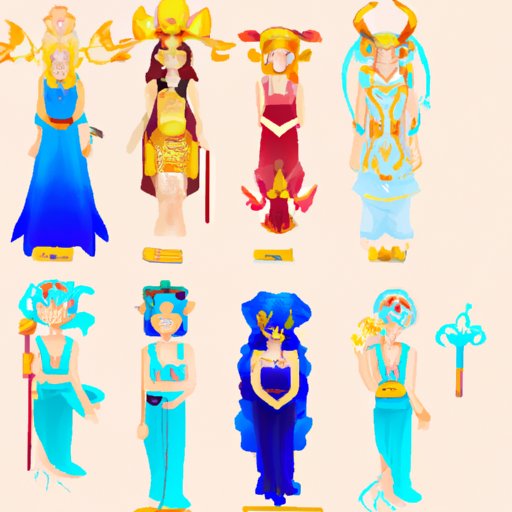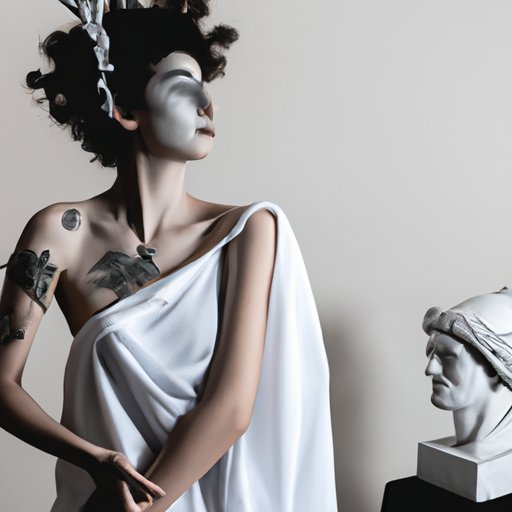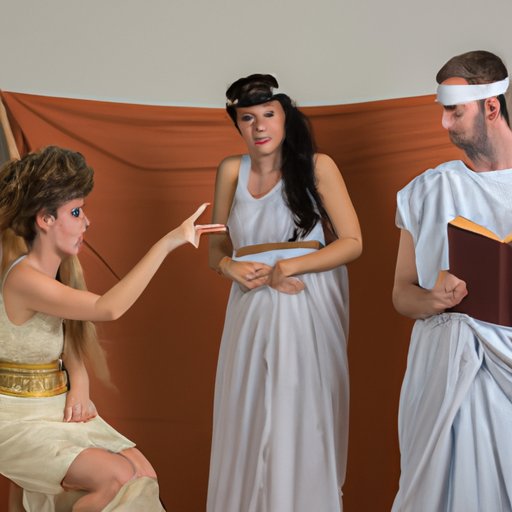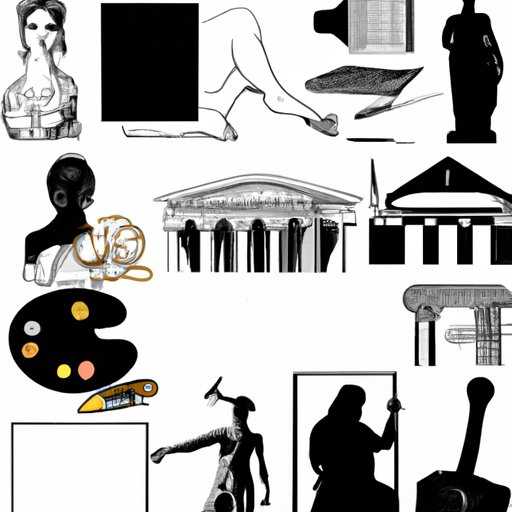Introduction
Greek mythology is an integral part of our culture today, influencing everything from literature and film to architecture and fashion. For centuries, people have been fascinated by the tales of gods and goddesses, heroes and villains, which make up the stories of Greek mythology. In this article, we will explore how these stories have shaped our culture and continue to do so today.
Greek Mythology in Literature, Film and Television
The influence of Greek mythology can be seen in many aspects of popular culture today. From the earliest days of literature, authors have drawn inspiration from the tales of Greek mythology. William Shakespeare’s plays often drew on elements of Greek mythology, and he was not alone in his use of these stories. Many modern authors have also used Greek mythology as a source of inspiration, from J.K. Rowling’s Harry Potter series to Rick Riordan’s Percy Jackson books.
It is not just literature that has been influenced by Greek mythology. The themes and characters of these stories have been adapted for film and television as well. Movies such as Clash of the Titans and Troy draw heavily on Greek mythology, while shows like Hercules: The Legendary Journeys provide a more light-hearted take on these tales. By bringing these stories to the big and small screens, they become even more ingrained in our culture.

Gods and Goddesses Representing Traits and Characteristics
The gods and goddesses of Greek mythology each represent different traits and characteristics. Zeus is the king of the gods and is associated with justice and power. Athena is the goddess of wisdom and is known for her strategic thinking and intelligence. Aphrodite is the goddess of love and beauty, and she is often seen as a symbol of passion and desire. These representations remain relevant in our culture today, with people drawing upon them in their everyday lives.
In addition to representing different traits and characteristics, the gods and goddesses of Greek mythology can also be viewed as archetypes. An archetype is a universal character type that can be found in all cultures and time periods. By understanding these archetypes, we gain a better understanding of ourselves and our place in the world.
Impact of Greek Myths on Modern Architecture and City Planning
The influence of Greek mythology can also be seen in the architecture and city planning of modern cities. Many cities around the world have adopted designs inspired by Greek mythological themes. The city of Athens in Greece is perhaps the most obvious example, with its Acropolis and Parthenon structures being iconic symbols of the city. Other cities, such as Washington D.C., have also adopted elements of Greek mythology into their designs.
These structures reflect the themes of Greek mythology, such as power, justice, and wisdom. By incorporating these elements into the design of their cities, people are able to bring these stories to life and create a physical representation of the ideas and beliefs of their culture.

Influence of Greek Mythology on Art and Fashion
The influence of Greek mythology can also be seen in the art and fashion of today. Many works of art incorporate elements of Greek mythology, such as paintings of gods and goddesses or sculptures depicting scenes from ancient tales. These works of art remind us of the stories that have been passed down through the generations and give us a glimpse into the past.
Likewise, fashion designers have used Greek mythology as a source of inspiration for their creations. From clothing featuring images of gods and goddesses to jewelry inspired by ancient symbols, these pieces of fashion allow us to express our connection to these stories and wear them on our sleeves.

Adaptation of Greek Myths as Teaching Tools
Finally, Greek myths are often used as teaching tools in schools. By exploring these stories, students are able to gain an understanding of the values and beliefs of the ancient Greeks. They learn about the power of storytelling, the importance of morality, and the consequences of one’s actions. These lessons are still applicable in our modern world and can help students navigate their own lives.
In addition to learning about the values and beliefs of the ancient Greeks, students can also gain an appreciation for the power of language. Through studying the stories of Greek mythology, students can develop a better understanding of how words can be used to express emotions and convey meaning.
Conclusion
In conclusion, it is clear that Greek mythology has had a profound influence on our culture today. From literature and film to architecture and fashion, these stories have shaped our understanding of the world around us. They have provided us with archetypes to identify with and have given us lessons to live by. Whether we are aware of it or not, these stories remain a part of our lives and will continue to shape our culture for years to come.
(Note: Is this article not meeting your expectations? Do you have knowledge or insights to share? Unlock new opportunities and expand your reach by joining our authors team. Click Registration to join us and share your expertise with our readers.)
